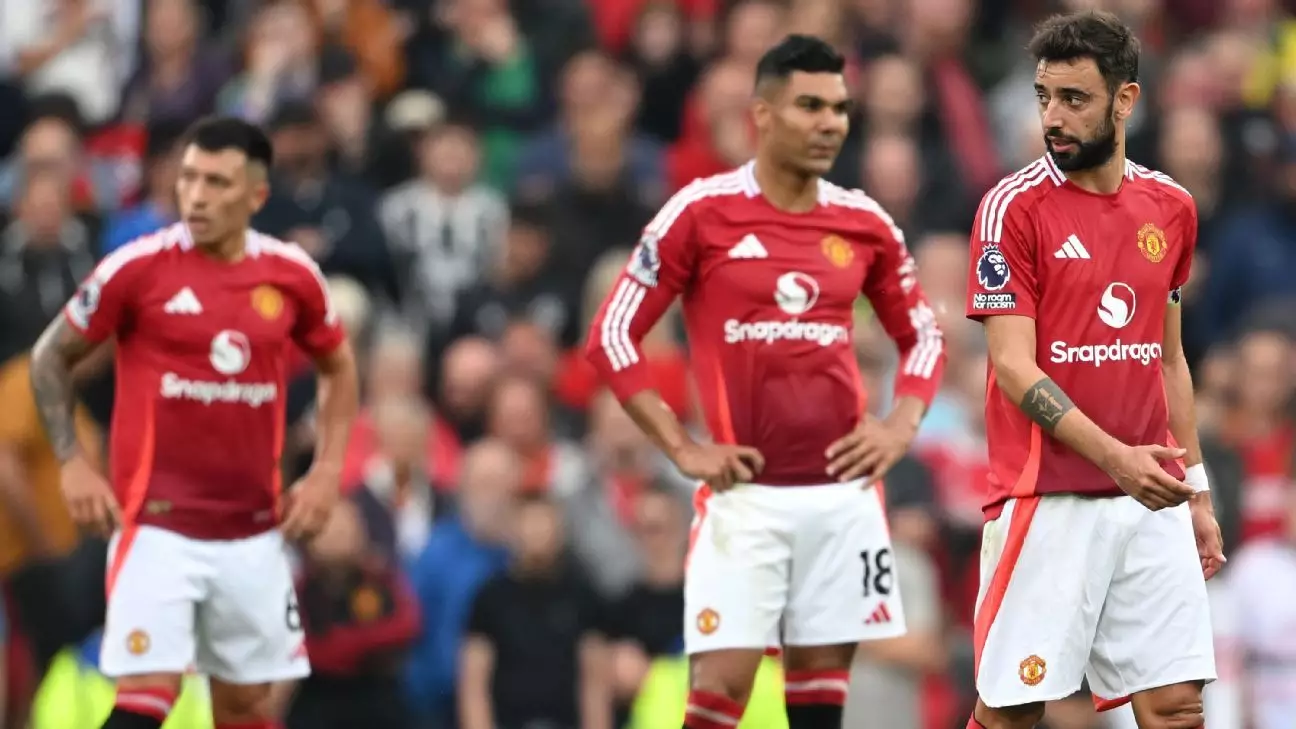As the elite clubs in the Premier League embark on a new season, the ongoing situation at Manchester United stands out as a case study of mismanagement and underperformance. With the team languishing in 14th place and having secured only two wins from seven matches, it is hard to ignore the mounting pressure on manager Erik ten Hag. This dismal record marks the club’s worst start in recent memory, leaving fans and pundits alike questioning the future of a manager who has now overseen two consecutive poor openings to the season.
The forthcoming board meeting, which includes key figures such as Sir Jim Ratcliffe and sports executives from Ineos, raises the pertinent question: is it time for significant changes at the managerial level? Ten Hag’s position could very well be at the forefront of discussions, as the stakeholders grapple with the club’s alarming trajectory and the persistent failure to integrate a coherent footballing philosophy.
To understand the current malaise that has engulfed Manchester United, one must look beyond Ten Hag and investigate the broader scope of organizational shortcomings that have contributed to this disappointing start. The problems at United are deeply ingrained and stretch back over a decade, originating from disastrous recruitment policies made in the twilight years of Sir Alex Ferguson’s reign.
Despite these historical challenges, Ten Hag has made a series of questionable decisions that have further isolated him in this notorious legacy. Notably, the recruitment of Antony for £85 million has raised eyebrows due to the winger’s underwhelming contributions. Additionally, the signing of the injury-prone Mason Mount hints at a lack of foresight in transferring processes, as the team grapples with issues of fitness and performance continuity.
Despite previous upheavals, the club had a unique opportunity to reassemble a winning formula, having won the FA Cup against significant odds. However, instead of utilizing that momentum to inspire further success, they allowed Ten Hag to persist in what has now become a glaring oversight. The importance of this choice looms heavier than ever as the new season continues to unfold unfavorably.
Perhaps one of the most troubling aspects of Ten Hag’s management has been his inability to stimulate improvement from key players within the squad, like Marcus Rashford. Having previously performed phenomenally under Ten Hag with 17 goals in one season, Rashford’s form last season fell drastically. While some external factors—such as personal issues—may be at play, a manager’s role extends beyond merely providing instructions; it involves nurturing players through both highs and lows.
Unfortunately, the manager’s public criticism of Rashford seems counterproductive at best. Demanding accountability is necessary, but the insistence on chastising players publicly can erode confidence and further complicate already challenging dynamics. Such interactions have left Rashford adrift, questioning not only his role within the team but also his own abilities, an eventuality that no club can afford when aiming for excellence.
United’s defensive frailties stand as a glaring issue, with Ten Hag entering his tenure boasting a tactical approach that has proven ineffective—31 games conceding two or more goals is nothing short of alarming. Despite two years in charge, problems remain unresolved, leaving fans frustrated at a lack of tactical evolution. The reliance on older defenders like Harry Maguire and Jonny Evans, who lack the dynamism required in the fast-paced Premier League, raises questions regarding Ten Hag’s tactical acumen.
The neglect of a fit left-back during the offseason, compounded by Casemiro’s declining performance, underscores fundamental inadequacies in squad planning. Despite the financial constraints that have haunted the club, realigning priorities sooner could have alleviated some of these pressing issues. The delay in acquiring key players, such as Manuel Ugarte, exemplifies the mishandling of transition periods in crucial moments.
As the curtains rise on yet another chapter of a tumultuous era for Manchester United, the burning question remains—can Erik ten Hag turn the tide, or is it time to look for alternatives? The club’s legacy, which once encompassed dominance and prestige, has been tarnished by a failure to adapt to modern football challenges.
Is history repeating itself in waiting for the miraculous turnaround akin to Sir Alex Ferguson’s early struggles? While the Ferguson saga offered a glimmer of hope, it should not serve as a crutch for decision-makers hesitant to act on pressing issues. For United to reclaim their status among football’s elite, constructive changes must occur—be it in leadership approaches or player management.
The time for reflection and strategic adaptation is now. This is a pivotal moment in Manchester United’s storied history, and inaction may very well herald further decline. The decisions made in the coming weeks will likely dictate the club’s trajectory, as the wider footballing community watches with bated breath.

